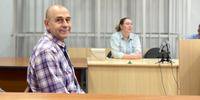The Case of Salnikov in Magnitogorsk
Filter
- #
Senior investigator of the Ordzhonikidze Department of the Investigation Department S. K. Bisenbaeva initiates a criminal case against Alexander Salnikov under Part 1 of Article 282.2 of the Criminal Code of the Russian Federation (organization of the activities of an extremist association, in respect of which the court made a decision on liquidation). This is how the investigation interprets meetings of believers to discuss biblical teachings with friends.
- #
The Leninsky District Court of Magnitogorsk, Chelyabinsk Region, orders a search of 7 addresses of Jehovah's Witnesses. The search petition was filed by Nikita Razumov, senior investigator of the Leninsky Interdistrict Investigation Department of the Investigative Committee of the Russian Federation for the Chelyabinsk Region.
- #
In Magnitogorsk, Jehovah's Witnesses are being searched at 8 addresses.
- #
Nikita Razumov, an investigator of the Leninsky Department of the Investigation Department, takes a written undertaking not to leave Alexander Salnikov.
- #
Investigator, Colonel of Justice E. V. Mayboroda attracts Salnikov as an accused. The believer declares: "I do not consider myself guilty, I have never carried out extremist activities, I have not organized or participated in the activities of any extremist association. I am petitioning for the termination of the criminal case due to the lack of corpus delicti."
- #
The case is submitted to the Ordzhonikidze District Court of Magnitogorsk. It will be considered by judge Olga Prokopenko.
- #
Alexander Salnikov expresses his attitude to the charges against him: "The specific events related to the actions imputed to me are not indicated in the indictment: neither the date, nor the time, nor the place, nor the method, nor the actions themselves ... It remains unclear how I could coordinate my actions with a non-existent organization or how I coordinated my actions with an organization whose activities I myself allegedly organized.
Salnikov reminds the court that on April 20, 2017, the Supreme Court of the Russian Federation did not ban the activities of Jehovah's Witnesses as a religious denomination and did not require believers to stop exercising their constitutional rights and freedoms.
Then there is the interrogation of a 75-year-old woman who had a search and two interrogations in connection with the case of Alexander Salnikov. She describes the believer as a deeply decent and honest person: "It is very rare to meet such people in life." When asked how Jehovah's Witnesses feel about other religions, the woman replies: "They have no animosity. Jehovah's Witnesses respect other religions." The prosecutor reads out her testimony from the record of the investigator's interrogation. The woman refuses her words.
Near the courthouse there are about 60 people who came to support the defendant.
- #
Prosecution witnesses are being questioned. The first was FSB officer Yevgeny Ilyin, who searched Alexander Salnikov's home. He says that during the search, secular literature and clippings from the Criminal Code and the Code of Criminal Procedure of the Russian Federation were seized, among other things. According to Ilyin, the believer during the search did not deny that he was one of Jehovah's Witnesses. The witness could not say what was the incitement of religious hatred on the part of Salnikov. According to him, he does not remember many dates, places and details.
The next student who participated in the search as a witness is interrogated. He says that during the search, Salnikov became ill. According to the witness, the presence of a webcam on the believer's computer indicates that he was the organizer of online worship.
The third witness explains that he has known the defendant since about 2005. "I have very deep respect for this person, he is respectable, has many positive qualities ... A conscientious worker in production, a good family man who loves his family," he characterizes the believer. The witness claims pressure during one of the interrogations: according to him, FSB officer Ilyin shouted at him using obscene language and threatened. On this basis, the witness retracts his previous testimony, stating that he signed it under duress. When the judge shows him the record of the interrogation, he states that he did not say this.
The court refuses to disclose the testimony of witnesses who did not appear to the prosecutor.
- #
The defendant reads out his written notes, in which he emphasizes that he has nothing to do with extremism.
- #
"The advice and requirements for Christians, which are recorded in the Bible, are essentially anti-extremist. Therefore, my actions — the fact that I met with friends and studied the Bible — were not only peaceful, but also had nothing to do with extremism," Aleksandr Salnikov makes his final statement.
The final statement of the defendant Alexander Salnikov in Magnitogorsk

